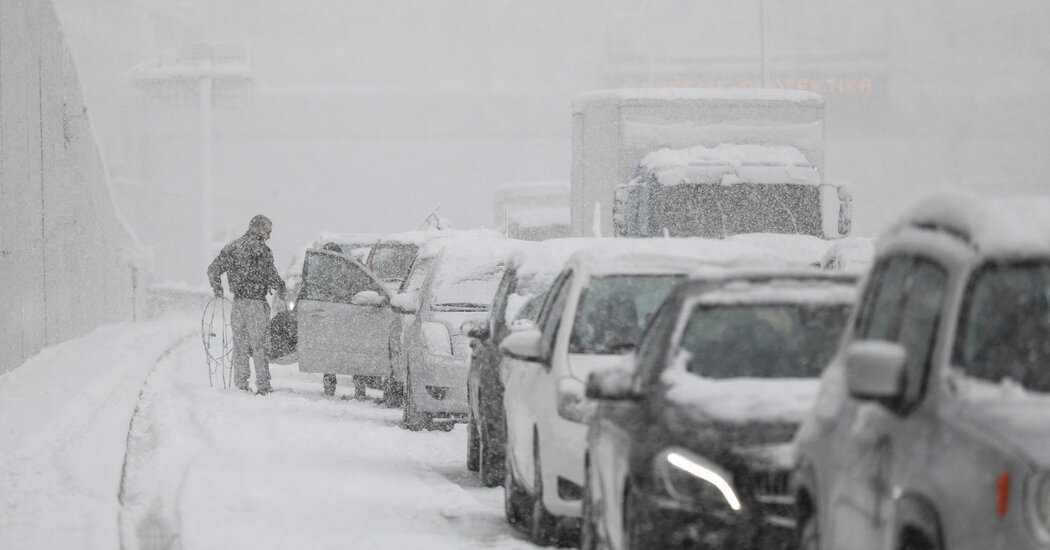In areas more used to dealing with extreme heat, blizzard conditions caused chaos on roads and at airports.
ATHENS — A rare heavy snowfall in the Mediterranean had emergency services scrambling on Tuesday to rescue people stranded in their cars, some for more than 20 hours, and caused transportation chaos and power outages in Greece and Turkey.
Heavy snow fell for more than 12 hours on Monday, covering the Greek capital, where the snow was a foot deep in parts, as well as several Aegean islands. Parts of Turkey were also blanketed.
These areas are more used to dealing with extreme heat in the summers than snow in the winter. Though a snowstorm in Greece last February caused traffic and power problems, this week’s storm caused greater upheaval.
The cold front eased its grip on Athens on Tuesday and was forecast to move south, with the island of Crete expected to be among the hardest hit. Snow is expected to continue in Turkey until Friday.
Around 3,500 people were rescued from the main Athens ring road overnight on Monday, though 1,200 cars remained stuck, a government spokesman, Giannis Oikonomou, told Greek radio on Tuesday morning.
In Istanbul, thousands of people were also stuck on snowy roads as the storm paralyzed traffic and disrupted flights. At the airport, the roof of a hangar collapsed under the weight of the snow, and all operations were stopped until midday Tuesday.
Rescue operations in Athens involving the armed forces, police and fire service continued on Tuesday, and Greece’s civil protection minister, Christos Stylianides, apologized to drivers, some of whom were stranded for more than 20 hours in freezing conditions.
“Every attempt was made to meet the needs of people who found themselves in such a difficult situation,” Mr. Stylianides said, adding that a “superhuman effort” was underway.
By Monday evening, army personnel had distributed blankets, food and water to motorists. But some drivers grew tired of waiting and abandoned their vehicles. News video showed people trudging through the snow carrying luggage or small children and clambering over roadside railings into a suburban railway station.
The government and the private company that manages the Athens ring road appeared to trade accusations over who was responsible for the mess. The government said penalties would be imposed and that the company would give each affected motorist 2,000 euros, or about $2,250.
The company agreed to pay, but a spokesman, Fanis Papadimitriou, dismissed critics who said the company should have closed the road earlier, saying in a TV interview that a private company could not make that decision.
Greek television also carried live phone calls with frustrated motorists, including a 75-year-old man who spoke with the private channel Skai on Tuesday morning. The man gave his name as Christos and appealed for help, saying he had been stranded for 20 hours on the ring road with a 79-year-old friend who had asthma.
“Please, tell them to show mercy. You can’t believe what’s happening here. Don’t we exist for them?” he said, adding that the gas in his car had run out. “I can’t take it, I’m shaking, I won’t make it,” he said. A later interview revealed that he had been rescued.
Vassilis Vathrakoyiannis, the spokesman for the Greek fire service, said part of the problem was that drivers failed to heed warnings to put snow chains on their tires. “Once the really heavy snowfall started, the snow rose from 1 centimeter to 15 centimeters,” he said. “Then it was over. When one car gets stuck, all the others behind it are stuck too.”
The authorities ordered the closure of schools as well as nonessential public services and private businesses on Tuesday and Wednesday in greater Athens and on many of the Aegean islands where villages were cut off by the snow.
A handful of services including hospitals, pharmacies, gas stations and supermarkets could continue to operate, though people were asked to leave home only for essential business. Vaccination centers were also closed.
Many parts of greater Athens remained without power as utility workers could not reach them to restore supply.
Cars and trucks were also abandoned on the main arteries of Istanbul, causing gridlock. People took shelter in nearby mosques and in hotels. Some 3,000 people were trapped in a shopping mall, with many sleeping on the floor and the Turkish Red Crescent supplying food, television news showed. Universities were shut into next week.
At the Istanbul airport, where hundreds of passengers spent Monday night, frustration turned to protests. Dozens of passengers chanted, saying they needed a hotel, in videos shared on social media.
In Athens, a new mother, just discharged from the hospital, said on Monday morning that she was stuck in the northern suburbs. “We’re trapped,” the woman, who gave her name as Ioanna Safrani, told the news site Iefimerida. “No one has come by to help us and I am in here with a baby that it is three days old. Isn’t there anyone that can help?”


























